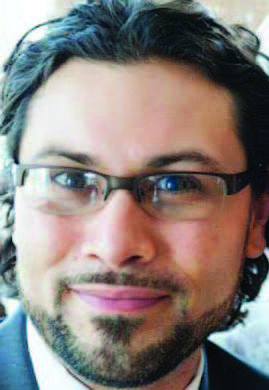CHICAGO STATE UNIVERSITY RECEIVES GRANT TO FURTHER QUANTUM EDUCATION
Dr. Russell Ceballos, of Chicago State University, is the co-principal investigator of the QuSTEAM grant, which provides $700,000 to five institutions to develop a Quantum Education program. Photo courtesy
of Dr. Russell Ceballos.
A new STEM initiative will enable Chicago State University and other universities to have a bigger impact when it comes to diversity in Quantum Information Science and Technology.
QuSTEAM, which stands for Quantum Information Science, Technology, Engineering, Arts and Mathematics, recently received $700,000 from the National Science Foundation. Chicago State University is one of five universities to receive part of the funding.
Russell Ceballos, Ph.D., works in the Department of Chemistry, Physics and Engineering Studies at Chicago State University. He is one of the lead scientists for the QuSTEAM initiative.
The goal of the initiative is to develop a national model for an undergraduate curriculum in quantum science.
Ceballos who is known for his work in quantum technology, has been invited to be a co-principal investigator in the initiative. He said it is a partnership between Fermilab, Argonne, Northwestern, University of Illinois and the University of Wisconsin -Madison. “This really is a convergent situation based on the fact that industry needs new workers and we’re not getting the numbers we need into physics or the computer science programs that have some quantum components. Part of it is just that it is too much course work, too much time involved,” he said.
Ceballos said the main focus should be on developing programs to train people in the field of quantum technology. He said, with quantum education, there needs to be more reaching out to traditional science students who are going into the field.
“So, my role has been to really leverage my experience working with and being a minority and having experienced many of the struggles that our students do, and really develop successful strategies and part of programs to work around these issues,” he said.
Ceballos said lack of access to educational resources and a very unwelcome environment to different learning styles, are some of the reasons why there are not more minorities and women in quantum technologies.
Ceballos said with the education program, the overall hope and goal is to leverage the opportunity in developing the quantum technology field to close the gap between rich and poor and opportunities between women and minorities in STEM.
Ceballos said with quantum science there are more opportunities and the money is there and there is a need for more minorities. He said the goal is to make sure the students have a realistic path and have the funding and resources to maintain the race. He described it as a marathon. “We want to find a way for people to do this without having to go through such a long and lengthy process,” he said.
Ceballos said with it is a multi-stage grant. He said it is important for the students to finish the program and find employment. “We want to have multi-layered networks in order to support students beyond their degree program, but into the next phase. Something that stretches and reaches into their program and helps them start developing these connections and start working in these environments and also beyond their program, so they have that extra support they need to succeed,” he said. “I want to make sure I give people a voice and give the South Side a voice. Because quantum technology is one of these areas where it can really leave minorities and women behind or it can be this equalizer.”
Douglas Maughan is the head of the National Science Foundation Convergence Accelerator program. He said quantum technology has the potential to accelerate solutions for society and expand the United States’ industrial base, create jobs and provide significant progress towards national needs.
“Because of its societal impact, quantum is a focus of NSF’s Convergence Accelerator program, and the QuSTEAM phase one effort is pursuing an innovative approach to meeting the educational needs necessary to develop and accelerate an undergraduate quantum information sciences curriculum and national education model,” he said. “Over the next nine months, the QuSTEAM team will build a proof-of-concept strategy, identify team members, forge cross-cutting partnerships, and design approaches that would assist students, including underrepresented groups, in finding job opportunities advancing into professional careers.”
Latest Stories
- Oboist Receives Support From Initiative Geared Toward More Diversity In Classical Music
- Glodean Champion Launches "The Process to LOVE™"
- Sundial Media & Technology Group and Creator Currency Networks Launch CreateHer Network to Address $31.8 Trillion Women Creator Economy Gap
- Illinois Peace Project Debuts the 2025 'Peace Portraits’ Honorees
- DCASE Brings Two Major Exhibitions to the City of Chicago This Summer: Fabiola Jean-Louis’ Waters of the Abyss and Blondell Cummings: Dance as Moving Pictures
Latest Podcast
STARR Community Services International, Inc.

